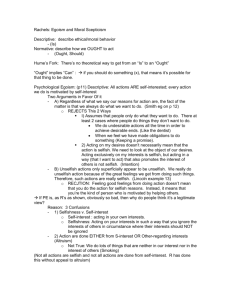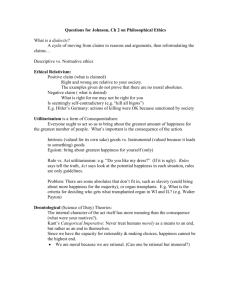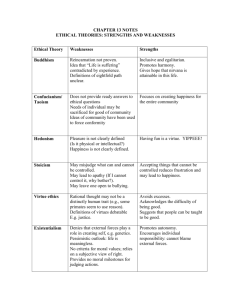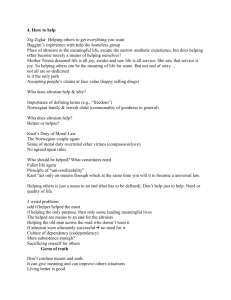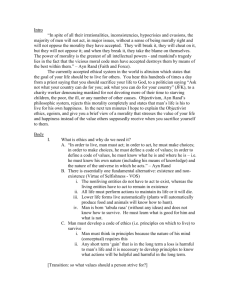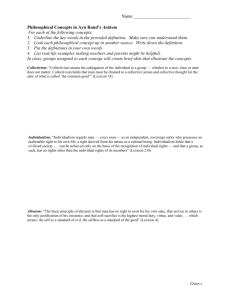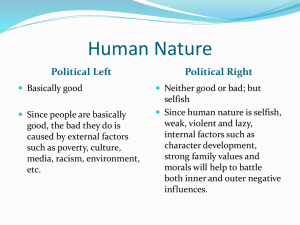the importance of selfishness, the dangers of altruism
advertisement
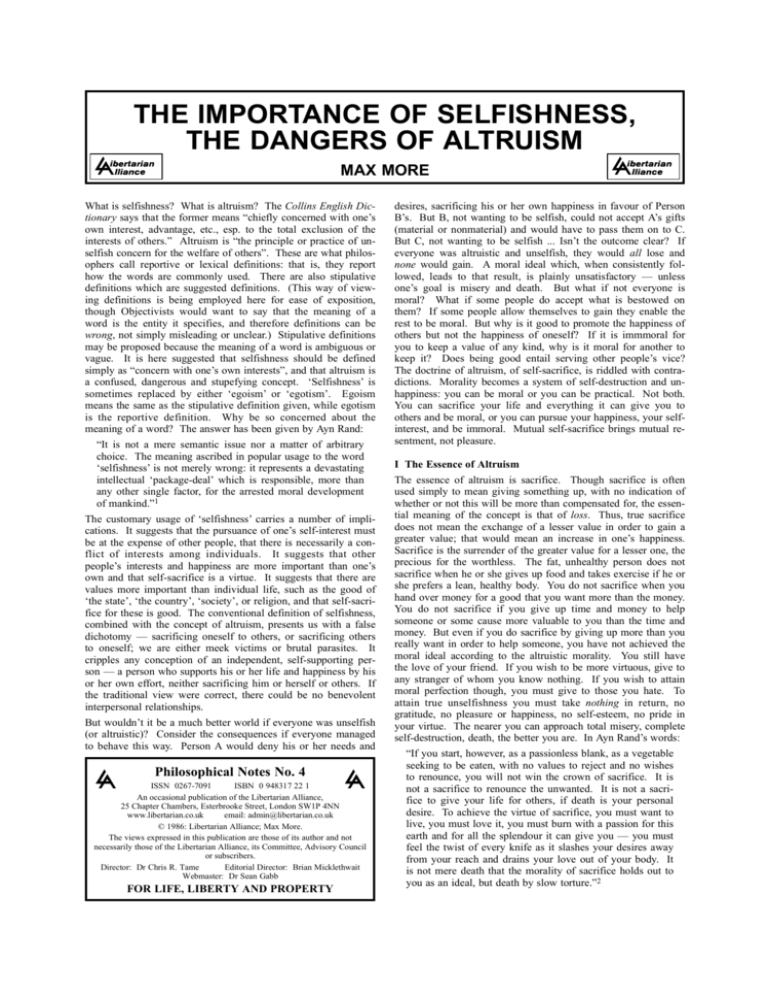
THE IMPORTANCE OF SELFISHNESS, THE DANGERS OF ALTRUISM MAX MORE What is selfishness? What is altruism? The Collins English Dictionary says that the former means “chiefly concerned with one’s own interest, advantage, etc., esp. to the total exclusion of the interests of others.” Altruism is “the principle or practice of unselfish concern for the welfare of others”. These are what philosophers call reportive or lexical definitions: that is, they report how the words are commonly used. There are also stipulative definitions which are suggested definitions. (This way of viewing definitions is being employed here for ease of exposition, though Objectivists would want to say that the meaning of a word is the entity it specifies, and therefore definitions can be wrong, not simply misleading or unclear.) Stipulative definitions may be proposed because the meaning of a word is ambiguous or vague. It is here suggested that selfishness should be defined simply as “concern with one’s own interests”, and that altruism is a confused, dangerous and stupefying concept. ‘Selfishness’ is sometimes replaced by either ‘egoism’ or ‘egotism’. Egoism means the same as the stipulative definition given, while egotism is the reportive definition. Why be so concerned about the meaning of a word? The answer has been given by Ayn Rand: “It is not a mere semantic issue nor a matter of arbitrary choice. The meaning ascribed in popular usage to the word ‘selfishness’ is not merely wrong: it represents a devastating intellectual ‘package-deal’ which is responsible, more than any other single factor, for the arrested moral development of mankind.”1 The customary usage of ‘selfishness’ carries a number of implications. It suggests that the pursuance of one’s self-interest must be at the expense of other people, that there is necessarily a conflict of interests among individuals. It suggests that other people’s interests and happiness are more important than one’s own and that self-sacrifice is a virtue. It suggests that there are values more important than individual life, such as the good of ‘the state’, ‘the country’, ‘society’, or religion, and that self-sacrifice for these is good. The conventional definition of selfishness, combined with the concept of altruism, presents us with a false dichotomy — sacrificing oneself to others, or sacrificing others to oneself; we are either meek victims or brutal parasites. It cripples any conception of an independent, self-supporting person — a person who supports his or her life and happiness by his or her own effort, neither sacrificing him or herself or others. If the traditional view were correct, there could be no benevolent interpersonal relationships. But wouldn’t it be a much better world if everyone was unselfish (or altruistic)? Consider the consequences if everyone managed to behave this way. Person A would deny his or her needs and Philosophical Notes No. 4 ISSN 0267-7091 ISBN 0 948317 22 1 An occasional publication of the Libertarian Alliance, 25 Chapter Chambers, Esterbrooke Street, London SW1P 4NN www.libertarian.co.uk email: admin@libertarian.co.uk © 1986: Libertarian Alliance; Max More. The views expressed in this publication are those of its author and not necessarily those of the Libertarian Alliance, its Committee, Advisory Council or subscribers. Director: Dr Chris R. Tame Editorial Director: Brian Micklethwait Webmaster: Dr Sean Gabb FOR LIFE, LIBERTY AND PROPERTY desires, sacrificing his or her own happiness in favour of Person B’s. But B, not wanting to be selfish, could not accept A’s gifts (material or nonmaterial) and would have to pass them on to C. But C, not wanting to be selfish ... Isn’t the outcome clear? If everyone was altruistic and unselfish, they would all lose and none would gain. A moral ideal which, when consistently followed, leads to that result, is plainly unsatisfactory — unless one’s goal is misery and death. But what if not everyone is moral? What if some people do accept what is bestowed on them? If some people allow themselves to gain they enable the rest to be moral. But why is it good to promote the happiness of others but not the happiness of oneself? If it is immmoral for you to keep a value of any kind, why is it moral for another to keep it? Does being good entail serving other people’s vice? The doctrine of altruism, of self-sacrifice, is riddled with contradictions. Morality becomes a system of self-destruction and unhappiness: you can be moral or you can be practical. Not both. You can sacrifice your life and everything it can give you to others and be moral, or you can pursue your happiness, your selfinterest, and be immoral. Mutual self-sacrifice brings mutual resentment, not pleasure. I The Essence of Altruism The essence of altruism is sacrifice. Though sacrifice is often used simply to mean giving something up, with no indication of whether or not this will be more than compensated for, the essential meaning of the concept is that of loss. Thus, true sacrifice does not mean the exchange of a lesser value in order to gain a greater value; that would mean an increase in one’s happiness. Sacrifice is the surrender of the greater value for a lesser one, the precious for the worthless. The fat, unhealthy person does not sacrifice when he or she gives up food and takes exercise if he or she prefers a lean, healthy body. You do not sacrifice when you hand over money for a good that you want more than the money. You do not sacrifice if you give up time and money to help someone or some cause more valuable to you than the time and money. But even if you do sacrifice by giving up more than you really want in order to help someone, you have not achieved the moral ideal according to the altruistic morality. You still have the love of your friend. If you wish to be more virtuous, give to any stranger of whom you know nothing. If you wish to attain moral perfection though, you must give to those you hate. To attain true unselfishness you must take nothing in return, no gratitude, no pleasure or happiness, no self-esteem, no pride in your virtue. The nearer you can approach total misery, complete self-destruction, death, the better you are. In Ayn Rand’s words: “If you start, however, as a passionless blank, as a vegetable seeking to be eaten, with no values to reject and no wishes to renounce, you will not win the crown of sacrifice. It is not a sacrifice to renounce the unwanted. It is not a sacrifice to give your life for others, if death is your personal desire. To achieve the virtue of sacrifice, you must want to live, you must love it, you must burn with a passion for this earth and for all the splendour it can give you — you must feel the twist of every knife as it slashes your desires away from your reach and drains your love out of your body. It is not mere death that the morality of sacrifice holds out to you as an ideal, but death by slow torture.”2 2 II Motives and Beneficiaries Why would anyone preach the virtue of altruism, the goodness of self-sacrifice? If you are a religious functionary, or a politician, you have nothing of value to offer anyone. You wonder how on earth you are going to get people to give you power, an income, and prestige. Then you come across a ready-made doctrine called altruism and you see the answer. “Don’t be evil, don’t be selfish, pay your taxes, submit to my control and don’t complain. You must give up your autonomy, your self-government, so that I can force all those greedy, selfish people to help those in need.” “You cannot enter heaven unless you give away what you have ... and why not give it to the church which will use it unselfishly?” And a real quote: “It is thus necessary that the individual should finally come to realize that his own ego is of no importance in comparison with the existence of the nation ... This state of mind, which subordinates the interests of the ego to the conservation of the community, is really the first premise for every truly human culture ... the basic attitude from which such activity arises, we call — to distinguish it from egoism and selfishness — idealism. By this we understand only the individual’s capacity to make sacrifices for the comunity, for his fellow men.”3 The words are Adolf Hitler’s. It is not just priests and politicians who seek to gain an objective through preaching self-sacrifice; people in almost any situation may do so. Heed Harry Browne’s advice: “And when someone accuses you of being selfish, just remember that he’s only upset because you aren’t doing what he selfishly wants you to do.”4 (As we shall see, the other person is not in fact acting in his self-interest in the true sense of the word.) If you wish to be unselfish you will have to ignore your wishes, obliterate and obscure those thought-processes that give rise to motivations that are not acceptable. As psychologist Nathaniel Branden, and many others, have pointed out, this leads to emotional turmoil and feelings of alienation. (This alienation from the self is experienced as alienation from reality.) To sacrifice one’s happiness and desires (which can be altered gradually but not obliterated) is to sacrifice that which one values; to sacrifice one’s values is effectively denying one’s judgment and subverting one’s rationality. The doctrine of altruism, then, comes down to the sacrifice of one’s mind, one’s consciousness. It is this destruction of rationality that leads directly to guilt, fear, anxiety, depression, and other neurotic and psychotic behaviour. III The Rationale for Rational Selfishness The viewpoint from which morality is being discussed in this essay is that of rational egoism, or rational selfishness, and is an integral part of the ‘Objectivist’ philosophy as American philosopher and novelist Ayn Rand termed it. It should be stated that even subjectivists — those who assert there can be no objective foundation for ethics can understand the consequences of altruism, and can accept rational self-interest as the morality they wish to adopt, without having to accept Objectivism as a whole. Nevertheless, Objectivists argue that an objective foundation for morality can be provided, although there is not room to do so within this essay. (The interested reader is directed to the “recommended reading” list at the end, especially to the work of Eric Mack in Reading Nozick and in the collection edited by Den Uyl and Rasmussen.) There is room for only a few comments here to set the context of the discussion to follow. Moral objectivists are often accused of committing the ‘naturalistic fallacy’ or of invalidly deriving an ‘ought’ from an ‘is’. By this the subjectivist means that facts (‘is-statements’) are entirely different from values (‘ought-state- ments’) and that the latter cannot be derived from the former. This view is the product and continuing legacy of the empiricist epistemological tradition and is no longer persuasive (nor has it ever been to Aristotelians). Within the objectivist system the relation between facts and values is not a real problem, since values represent a kind of fact. ‘Value’ — that is, the object of an action, “that which one acts to gain and/or keep” (Rand) — expresses the beneficial or harmful relationship of some aspect of reality to a living being, and to say that something is of value to such a being is to say that it is conducive to its life, happiness, and well-being. Values must be based on the interest of individual organisms — that is, on their self-interest. For human beings, who have a conceptual faculty, a capacity for rational thought, self-interest can only be discovered by reason. Reason is not automatic; rational thought requires choice and an effort. Plants and animals automatically serve their natural interests, but humans must crucially rely on their reason. Hence the objectivist ethics holds rationality to be the supreme virtue from which all others derive. Evasion, the refusal to think, the refusal to recognize reality, is man’s basic vice. Some of the other virtues deriving from a commitment to reason are independence, honesty, integrity, productiveness, justice, and pride. As will be shown below, this view of selfish morality is not one of hedonism, self-indulgence, manipulation of or trampling on others, nor does it mean the egoist is self-centred in the sense of not considering the feelings and interests of others. IV Avoiding Confusion The pursuit of one’s true self-interest, that is, one’s rational selfinterest, is the height of morality. Thus it is obviously undesirable to allow ‘selfish’ to mean something evil. Even if you deny the objective basis of the morality described here, but you do not wish people to feel guilty about or ignorant of how to pursue their happiness, you can agree with this strategy. It will not do to say: “let us abandon the word ‘selfish’ and limit ourselves to ‘self-interest’ to describe our values.” At the beginning of this essay, the package-deal which the use of ‘selfish’ represents was explained. The implications are devastating morally and psychologically. Nothing less than a radical rejection of the use of the term, and all the views about reality that it implies, is necessary. There are many alternative terms that may be employed in place of ‘selfish’. ‘Mean’ has a range of uses: miserly, ungenerous, or petty; unpleasant; despicable, ignoble or callous; bad-tempered, vicious. In a situation where Person A has caused emotional pain to B, let us not say A is selfish; it makes better sense to say he is either ‘thoughtless’ or ‘vicious’. The former would be appropriate where B is of personal value to A but A has neglected to rationally consider the consequences of his action. The latter term is of broader use and does not falsely imply that vicious behaviour is conducive to one’s own happiness. (To those who raise the question, “might not viciousness make some people happy?”, I suggest a study of Nathaniel Branden’s books on psychology, and Peter Breggin’s The Psychology of Freedom.5) Instead of saying someone is being altruistic when they are being pleasant and thoughtful, it is better to say they are being generous or kind. The truly selfish person, the person who holds his or her own happiness as the purpose of his or her life, is not mean, petty, or nasty. Unlike the practitioner of a morality of self-sacrifice, they do not see others as threats. They can say “No” when they wish, but because of the way that they feel about human life in general, and of those whose moral values they share in particular, they find it is to their psychological benefit to be kind, pleasant, generous, thoughtful, polite. ‘Greed’ is a term that is often misused, though is not one that need be abandoned. The Collins English Dictionary says that greed is: “1. excessive consumption of or desire for food; gluttony. 2. excessive desire, as for wealth or power.” The word is 3 often used to refer to people pursuing their true self-interest and to this we must object. The essential part of the definition is excessive desire or consumption. Within the framework of objectivism that means desiring or consuming more than is good for the individual, i.e. more than is to that individual’s self-interest. We could also say that greed is wanting more of something through dishonesty or violation of the rights of others. Rich people or those who want to become rich are not necessarily greedy at all. Those who are obsessed with money, power, prestige or whatever, and who neglect their true self-interest in the pursuit of these, are greedy. V Desires, Whims, Self-Esteem and Benevolence What is the role of happiness in the Objectivist ethics? “It is seen as an emotional reward of lifeserving action — as a concomitant of successful life. Life requires the achievement of values; happiness is the emotional consequence of achieving the values proper to man — that is, appropriate to his nature and needs. Thus the maintenance of one’s life and the achievement of one’s happiness are seen as two aspects of a single achievement. To the extent that a man holds contradictory values, values that are incompatible with his nature and inherent needs and with the facts of reality, both his life and happiness are placed in jeopardy.”6 Each person must learn what his or her happiness objectively requires. Thus a person who is doing what he or she wants to do at that moment is not necessarily acting in their self-interest. Objectivists sometimes refer to those who frequently act blindly on momentary desires and feelings as “whim-worshippers”. A whim is “a sudden, passing, and often fanciful idea; impulsive or irrational thought”. It is a desire not considered and validated in the context of one’s knowledge and values. Once this context has been brought into focus (by the exercise of one’s rational faculty), one may decide that indulging that whim may not be to one’s interest. Rather than calling a whim-worshipper selfish when he or she has obviously not considered his or her selfinterest, it would make more sense to accuse them of blind or irrational self-indulgence (or simply of irrational behaviour). Here, the importance of rationality in contra-distinction to a blind following of feelings is obvious. This crucial difference between desire motivated behaviour and self-interested behaviour should be pointed out to those who use the words ‘selfish’ and ‘greedy’ without thought. An important factor in our happiness is the way we feel about other people. On the positive side, these feelings can range from mild affection to powerful romantic-sexual love. Love is a complex phenomenon but its major element is that of a response to the values embodied in another.7 Here the link between the selfesteem resulting from the rational pursuit of self-interest, and the ability to feel love and benevolence emerges. Complexities aside, the more one understands a person, and the more one shares his or her values, the more love one is capable of feeling for him or her. If that person is truly selfish then he or she will be psychologically visible to him- or herself and to others. If he or she is a self-sacrificer, then it will be more difficult to uncover an ego to love. Self-love and self-esteem are essential for love to flourish between people. Furthermore, self-love and self-esteem mean that one feels secure and experiences no need to demand and manipulate others into reinforcing one’s self-worth. Such behaviour is destructive of love and affection. Self-love and the psychological security resulting from a commitment to reason means that one will not be self-centred in the sense of trying to get others to boost one’s ego, or being constantly worried about one’s interests. Selfish people don’t need others to take care of them — they’ve taken care of themselves. Since they are secure and happy they can consider the interests of others. Since others cannot be a threat to them, people are a potential source of interest and pleasure. Thus the selfish person feels a spontaneous benevolence and a desire to help and be pleasant to others. The self-sacrificer and self-denier can only see others as threats, as sources of pain, as another person to force oneself to sacrifice to. The inevitable result of altruism is the breeding of hostility and fear. VI Capitalism, Competition, Selfishness The egoistic ethics of Objectivism imply rights to life, liberty and property. As Rand shows, the only social system consistent with Objectivist principles and the nature of man is a libertarian, free-market system. (Objectivists disagree over whether the principles imply an anarcho-capitalist or minimal-statist system — I believe it is the former.) If people look after their rational selfinterest, rely on their own judgment and not on any ‘higher’ authority, if they are honest, self-reliant, and proud, statism cannot take hold. If people were to conscously believe in, demand, and secure their right to their own lives and happiness, the cancer of government would shrivel up and die. But if selfishness is evil and the beneficiaries of one’s actions should be everyone else, how can it be wrong for the state, the respresentative of the collective, to make us sacrifice? If the self is of no importance, why should not the state tax, regulate, and otherwise coerce us for ‘higher’ and ‘nobler’ ends? In Rand’s words again: “Tell it to anyone who attempts to justify capitalism on the ground of the ‘public good’ or ‘the general welfare’ or ‘service to society’ or the benefit it brings to the poor. All these things are true, but they are the by-products, the secondary consequences of capitalism — not its goal, purpose, or justification. The moral justification of capitalism is man’s right to exist for his own sake, neither sacrificing himself to others nor sacrificing others to himself; it is the recognition that man — every man — is an end in himself, not a means to the ends of others, not a sacrificial animal serving anyone’s need.”8 Throughout history capitalism has had little moral defence. The Utilitarian defence was pathetic and self-defeating. As Rand points out, the British socialists, the Fabians, were predominantly students and admirers of John Stuart Mill and Jeremy Bentham. What do individual rights — the underpinnings of libertarianism — matter if “the greatest good of the greatest number” is our stated goal? If some people are not willing to sacrifice themselves for ‘the common good’ or ‘the state’ then they must be forced. That means statism — ultimately socialism or fascism. “If service and self-sacrifice are a moral ideal, and if the ‘selfishness’ of human nature prevents men from leaping into sacrificial furnaces, there is no reason — no reason that a mystic moralist could name — why a dictator should not push them in at the point of bayonets — for their good, or the good of humanity, or the good of posterity, or the good of the latest bureaucrats’ latest five-year plan. There is no reason that they can name to oppose any atrocity. The value of a man’s life? His right to exist? His right to pursue his own happiness? These are concepts that belong to individualism and capitalism — to the antithesis of the altruist morality.”9 Our natural rights are those principles of social interaction derived from our nature as rational beings. They are based on the good for man — the sustenance of life and the pursuit of happiness — and on a consideration of the nature of moral agency. It is right for us to make free, unimpeded choices, even if they should turn out to be bad ones. It is not right for us to interfere with someone else’s choices by force or the threat of force, whether the choice will be good or bad for that person. It is in our self-interest to rely on reason rather than force to accomplish our aims. (Force is only right for the negative aim of 4 protecting ourselves against the violence of others.) We have a right to unimpeded, non-violent action. We do not have a right to the initiation of force because it is not in our interests and it is not in the interests of others, for whom it is right to oppose such action by force. (For a discussion of the derivation of rights from considerations of self-interest, and from the nature of moral agency, see Eric Mack’s essay in the collection by Den Uyl and Rasmussen.) We therefore have a right to ingest what substances we wish, to acquire and own private property to be used for any non-coercive purpose — whether for profits, brothels, or whatever — to engage in sexual activity with any consenting individual, to say what we wish — even if nasty, prejudiced or libelous — we have the right to live as we will. We do not have a ‘right to a job’ or to welfare or to education or to medical services since that implies that someone must be forced to provide them. We have only the right to make a voluntary exchange for them — with our own goods and services (or to accept them as free, unforced gifts.) Free market capitalism is a system of voluntary agreements and is therefore an ‘exploitative’ system — in the sense that people can use each other to their mutual benefit. It is not exploitative in the negative sense of “ripping someone off” or violating their rights. A voluntary market exchange can only occur if both participants expect to benefit. It is state interference that introduces gainers at the expense of losers — taxation, regulation, bureaucracy, involuntary unemployment, war. (At least, some people may think they gain but a higher income or other ‘gain’ is only to one’s interest if acquired morally and rationally.) The idea of ‘exploitative’ capitalism is only made possible by the usual definition of ‘selfish’ which, as we’ve seen, implies that one can only gain at another’s expense. VII The Nature of Competition Finally, it would be fitting to consider the matter of competition in the context of the pursuit of rational self-interest. Many people say that capitalism is an entirely competitive economic system. They say that competition, while it serves a number of useful purposes, breeds hostility, violence, and unhappiness. The first assertion is false and the second may or may not be true depending on how it is interpreted. Objectivists are principled moral agents, not ‘materialists’ and can therefore happily join in by condemning the “rat race”. The first point to note is that capitalism is both cooperative and competitive. Firms compete within a market but firms also cooperate every time they buy and sell raw materials, semi-finished goods, etc., from each other. Individuals within a firm must cooperate to get their jobs done. Every time anyone buys anything on the free market, cooperation is occurring; both parties get together to make a mutually beneficial exchange. On the other hand, in a socialist economy you are told what to produce and have little or no choice as to what you consume. Where competition exists in a free market it promotes progress and benefits everyone. In a socialist system, competition is for positions of coercive power. ers, insomniacs, or pillpoppers, with no regard for their happiness. Capitalism does not demand this, and though it does not prevent it (only force, with all its consequences, can do that), it does function better without it. Studies have shown that most successful managers in business are generally pleasant, non-compulsive individuals who are a pleasure to work for. It is altruism which promotes overly strenuous (and misguided) effort since the individual does not matter — only the good of the company/government/society/one’s parents matters. The rationally self-interested person has a great deal of self-esteem. The altruist lacks self-esteem. And it is lack of self-esteem that leads to neurotic, inappropriately competitive behaviour since the esteem of other people must be earned at all cost to fill the gap. (See Branden’s The Psychology of Self-Esteem for the importance of this factor.) If one has no self-worth one must compete hard to prove oneself to others. Rational people do not need to win, since that implies that you can’t be happy without defeating someone. There is no need to win. To play the game of life according to one’s values, in pursuit of one’s happiness, one’s self-interest, is all that matters. NOTES 1. Ayn Rand, The Virtue of Selfishness, New American Library, New York, 1964, p. vii. 2. Ayn Rand, Atlas Shrugged, New American Library, New York, 1957, p. 954. 3. From a speech by Adolf Hitler explaining the moral philosophy of National Socialism, quoted in Leonard Peikoff, The Ominous Parallels, New American Library, New York, 1982, p. 13. 4. Harry Browne, How I Found Freedom In An Unfree World, Avon Books/Macmillan, New York, 1973, p. 67. 5. See recommended reading list. 6. John Hospers, Introduction To Philosophical Analysis, Routledge, London, 1967, p. 593. 7. Nathaniel Branden, The Psychology of Romantic Love, Bantam Books, New York, 1980. 8. Ayn Rand, Philosophy: Who Needs It, Bobbs-Merrill, New York, 1982, p. 81. 9. Rand, ibid, p. 84. RECOMMENDED READING Ayn Rand: The Virtue of Selfishness New American Library, New York, 1964. Capitalism: The Unknown Ideal New American Library, New York, 1966. Philosophy: Who Needs It Bobbs-Merrill, New York, 1982. Nathaniel Branden: The Psychology of Self-Esteem NAS Publishing, Los Angeles, 1969. The Disowned Self Bantam Books, New York, 1971. Within a free market — or mixed economy such as ours — more than one type of competition is possible. One can compete in a friendly, relaxed way, always bearing in mind one’s values and rational self-interest. Or one can madly, obsessively, irrationally compete for ends set by other people — whether ‘society’, the company, the government, or parents. This second type of competition is truly a “rat race”, a scrambling for advancement where one’s self-interest and values are lost sight of. It is not competition between those pursuing their rational self-interest that is bad. It is competition between those trying to fulfill their irrational whims (perhaps for wealth or fame), or to conform to standards set by others. Peter R. Breggin: It is common for people to wear themselves down developing heart disease, ulcers, and hypertension, to become heavy drink- in C. Turner (ed.) The Case for Private Enterprise, Bachman and Turner, London, 1979. Psychology of Freedom Prometheus Books, New York, 1980. Leonard Peikoff: The Ominous Parallels New American Library, New York, 1982. Douglas Den Uyl and Douglas Rasmussen (eds.): The Philosophic Thought of Ayn Rand University of Illinois Press, Urbana, 1984. Chris R. Tame: “The Moral Case for Private Enterprise”


